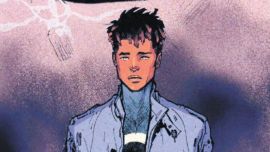A few days ago, a shock in the Marvel Universe caused a stir in Argentina: a new member of the X-men appeared, an Albiceleste one no less.
The new porteño comic book star is Valentín Correa, otherwise known as “Ransom,” and his debut came in the latest edition of Uncanny X-Men, the longest-running series in the X-Men comics franchise.
Created by Gail Simone and illustrator David Márquez (who is neither Latino nor Spanish), the description published by Marvel reads that “young Valentín was born in Buenos Aires with a black hole for a heart.” It continues: “When he was a child, he was abandoned by his parents after being kidnapped and held hostage for ransom, and he discovered that his captors’ bullets made him stronger, so he escaped. Ever since, he has travelled the most dangerous streets in the world.”
Excited by the arrival of the new creation with Argentine origins, we spoke with experts and a Marvel employee to talk about what this new inclusion means.
Identifying factors
“X-Men has forever featured the addition of characters from different nationalities who share an identifying factor: being mutants,” said Luciano Vecchio, an Argentine illustrator who works for Marvel, in an interview.
Vecchio has lately taken part in several important X-Men projects: Resurrection of Magneto, Iceman (which he also scripted), and Rise of Powers of X. He is currently working on alternative covers for Uncanny X-Men.
“The series has just been launched and so far, Ransom has only shown up in a single square and a promotional post, so we know very little of the character,” Luciano explained.
“That little bit was enough to cause plenty of reaction, so it’s already obviously a special contribution. Sharing such traits as nationality touches something and gives you a sense of belonging.
“It's worth noting that having an Argentine X-man is just one of the many aspects of the character – he’s not Captain Argentina and he doesn’t have the burden of representing a country or anyone in particular,” added the illustrator.
Vecchio described Simone, Ransom’s creator, as “a star.”
“She’s been an essential author over the last few decades. Besides having a key role in questioning and actively improving the role of female characters in fiction and women in the professional field, she’s an extremely talented writer who really reaches the audience,” he added.
“She’s one of the people in charge of relaunching the X-Men comic book line, one of Marvel’s big bets this year,” said the Marvel employee.
‘Starting a movement’
Fernando Bogado is a writer and a journalist. A few years ago he published, together with Sebastián Cantero, the graphic novel Las Guerras Metódicas (“The Methodical Wars”).
For Bogado, X-Men is an essential work in the global comic book universe, and “it has always been identified with social movements, with change that is resisted.”
The comic book expert is also enthusiastic about Simone and the creation of this Argentine X-man.
“This isn’t just another scriptwriter, she’s one of the major women scriptwriters in the American market. Simone was responsible for starting a movement – in 1999, on a webpage – which reflected a diversity of opinions and expressed a stance critical of the usual scheme of having a girlfriend, female friend, or female partner of the hero as a mere victim who is only good enough to be brutally murdered and thus give meat to the male protagonist’s story,” said Bogado.
The writer described Márquez as a “prolific illustrator,” who has experience working with the X-men series.
Enthusiasm
The enthusiasm is shared by Patricio Oliver, a comic book writer, illustrator and teacher who hosts two podcasts about comic books: ‘No somos X-Men’ (“We are not X-Men”); and one about illustrators, ‘Encuadre’ (“Framing”), with Pablo Vigo.
“I believe she [Simone] knows how to understand characters’ voices; building them on these identity bases which she uses to put together her scripts and further her protagonists,” he said.
“On the other hand, she has an incredible sense of humour, both in her stories and interactions on networks,” said Oliver. “She even talks about Mirtha Legrand!”
(A few days ago, Simone posted a GIF of the Argentine diva and wrote: “The new mutant: here she’s doing telepathy to communicate with her partner.”)
Oliver stressed too, however, that there was little information about Ransom in the public domain at present.
“We’re still not sure whether he’s an X-man. When a character of an underrepresented nationality shows up, it is expected to be the avatar of all that country’s attributes. As if it were a hyperbolic Argentineness.
“I don’t believe it is the responsibility of the author to have to represent the entirety of a nation in a comic book character either. That’s an impossible claim,” said Oliver.
“On the other hand, Gail Simone has a very explicit affection for Argentina. She has come here several times and she knows many elements of our culture and I trust that whatever she doesn’t know she’ll ask about,” he added.
Oliver, who described the furore in Argentina as “understandable,” highlighted that this is not the first Argentine star in the Marvel Universe.
“The first Argentine character showed up in Marvel in 1980 and he’s called El Defensor. Ge’s a construction worker from Córdoba who found an armour with powers dating back to a Spanish conquistador from the 14th century,” said the writer.
Mutant metaphor
The decades go by and X-Men continues to linger, like a story which continues to reveal senses. The films, prequels, spin-offs and all sorts of versions of that universe call on fandom and also transcend it.
Why has its popularity endured? Vecchio said that “through the mutant metaphor, X-Men speaks of sensitive subjects that transcend us as a society.”
“The mutants fight for the right to be who they are in a world that hates them, and therefore, attacks them,” he added.
The mutant metaphor overlaps with the question of the variety of nationalities in X-Men, where not everyone is from the United States.
“Valentín Correa, a.k.a. ‘Ransom,’ is not a one-off thing,” said Bogado. “He’s an Argentine mutant in a series that has always included figures which had little to do with the idea of the all-American superhero.”
by Pierre Froidevaux, Perfil

















Comments